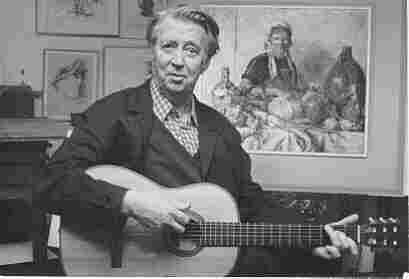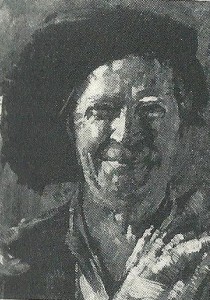“Who wants to live, so he must fight, and who does not want to fight in this world of eternal struggle does not deserve to live.” – Mein Kampf
From National Vanguard tabloid, Issue No. 63, 1978:
Sluyterman: Artist of Blood and Soil
Georg Sluyterman van Langeweyde, a great graphic artist, painter and folksong composer, died last January at the age of 74 [born: 4/13/1903]. His body was laid to rest in the German soil of his beloved Lueneburg Heath.
His graphic art combines a respect for the natural wonder of the forest, field and living earth and an admiration for the quiet, patient rural folk character.
In his clear, folk-based art, Sluyterman attacked the twentieth century tendency toward cosmopolitan formlessness and alienation.
In an Sluyterman graphic piece, man is one with nature, and one with his nature. He is not alienated from his surroundings, nor from his own racial soul.
Sluyterman’s style breathes a sense of order and place. His art unifies a natural realism and a sober idealism; A careful depiction of what is with an affirmation of what is to be.
His idealism was harmonious with the striving for perfection inherent in nature itself.
Sluyterman’s works convey a joyful affirmation of life. It is not the empty “happiness” of the rootless Pepsi generation, but the proud feeling of fulfillment which comes from meaningful accomplishment. His joy in living sprang from a humble awareness of man’s mortal place in the natural order.
Sluyterman was an artistic personality in the fullest sense of the term. He was something of a vagabond, who ignored social norms and the conventions of attire. He didn’t care about money or possessions.
As seriously as he took art, he was personally spontaneous, joyful and fun-loving. He enjoyed singing among friends in his full, baritone voice.* His warm personality, friendly smile and kind words came from the heart.
Sluyterman’s truly folkloric style won wide appreciation and high recognition. His masterful linoleum prints were displayed in the prestigious Great German Art Exhibition held annually in Munich from 1938 to 1944.
He was also an accomplished painter, and his popular country songs became accepted as genuine folk songs during his lifetime.
Sluyterman, whose ancestors came from Holland, was a great German and European patriot. He never sacrificed his honor for expediency or financial gain.
H was also no “sunshine patriot.” Sluyterman continued to defend his national cultural and political heritage even after the catastrophe of 1945. He was an active member of the patriotic German Cultural Foundation of the European Spirit (Deutsches Kulturwerk Europaeischen Geistes), founded after the Second World War.
—
* It’s assumed that the singer with the “full baritone voice” in this video is Georg Sluyterman:





Leave a Reply